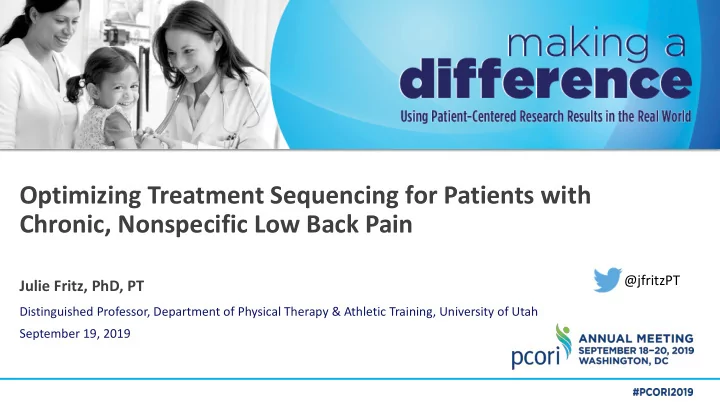

Optimizing Treatment Sequencing for Patients with Chronic, Nonspecific Low Back Pain @jfritzPT Julie Fritz, PhD, PT Distinguished Professor, Department of Physical Therapy & Athletic Training, University of Utah September 19, 2019
Julie Fritz • Has nothing to disclose. 2
Study Overview PCORI Priority Research Question: What is the comparative effectiveness of optimized, multidisciplinary nonsurgical treatments involving combined or sequenced interventions for patients with nonspecific chronic LBP? OPTIMIZE LBP Study: Optimizing treatment sequencing for patients with chronic, non-specific low back pain 3
Study Overview • Collaboration among 3 Healthcare Systems • Pragmatic Trial using sequential multiple assignment randomization trial (SMART) design • Recruiting 945 patients with chronic LBP seeking healthcare • Age 18-64 • Moderate pain and disability • Not currently receiving a study intervention for back pain • No back surgery in past year 4
5
Evidence Gaps Addressed by Study • Multiple non-pharmacologic treatments are beneficial for chronic LBP – BUT… • Characterized by Small Treatment Effects • Direct Comparisons Between Treatments often Equivocal • Little Guidance on Which Treatments Work for Which Patients • Prior Research has not Examined the Question of How to Sequence Treatments and What to Advise When a Patient Fails to Respond 6
Effects of nonpharmacological interventions for chronic LBP compared to usual care, placebo or control AHRQ Noninvasive Nonpharmacological Treatment for Chronic Pain: A Systematic Review 7
Evidence Gaps Addressed by Study • Patient Stakeholder Input – • 9 individuals with chronic LBP • Key themes: • Frustration: “ pain is a powerful overseer, you are willing to try anything that might help… You just don’t know what to do.” • Transition from expecting a “fix” towards managing symptoms: “ Initially my goal was to get rid of it, now I just want to be able to function.” • Connected pain to mood/stress: It’s a loop, goes from stress causing pain to pain causing stress and repeats ” 8
Evidence Gaps Addressed by Study • There is no singular effective treatment for chronic LBP. • Past studies have not examined the effect of how treatments are sequenced. • Past studies have examined a fixed treatment regimen, without adaptation to an individual patient’s response. • Past studies have not had enough participants to rigorously examine which treatment works for what type of patient. 9
Aims of the OPTIMIZE Study • Goal: examine common non-pharmacologic treatments with evidence of benefit: • Cognitive Behavioral Therapy • Physical Therapy • Mindfulness-Oriented Recovery Enhancement (MORE) • Primary Outcomes: • Function • Pain intensity 10
11
12
Exploratory Aim 4 Test 4 Adaptive Treatment Regimens: 1) Start with PT, Switch to CBT if non- responder 2) Start with PT, Switch to Mindfulness if non-responder 3) Start with CBT, Switch to PT if non- responder 4) Start with CBT, Switch to Mindfulness if non-responder 13
Methodologic Challenges and Lessons Learned • Explaining the design to potential participants. • Acceptability to patients of possibly changing providers after 8 weeks. • Total treatment time (particularly for Phase 1 non- responders) 14
Potential Impact on Practice • No prior trials compare CBT and PT for chronic LBP; • with sufficient sample size to examine heterogeneity of effects. • Patient and provider communication around changing treatment strategies based on responsiveness. • Pre-planning how to assess responsiveness and modify treatment accordingly • Opportunities to align payer financial incentives with evidence- based, non-pharmacologic, treatment strategies. 15
Learn More • www.pcori.org • info@pcori.org • #PCORI2019 • Optimize Trial 16
Questions? 17
Thank You! Julie Fritz Distinguished Professor, Department of Physical Therapy & Athletic Training, University of Utah @jfritzPT September 19, 2019 18
Recommend
More recommend